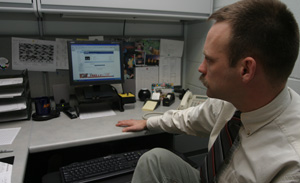Twelve faculty members, two administrators and three student representatives were appointed to the Facebook Task Force, which met officially for the first time Tuesday.

Doreen Hettich-Atkins, coordinator for special services and programs for Student Affairs and Campus Life, will chair the committee with Mike Taves, executive director of Information Technology Services.
Brian McAree, vice president of Student Affairs and Campus Life, said the growing popularity of social networking Web sites like Facebook inevitably affect students’ lives and colleges need to learn how to react.
“It’s very hard not to pick up a Chronicle of Higher Education or one of our professional publications without the issue of MySpace and Facebook popping up,” McAree said. “It’s a phenomenon all over the country and obviously as students use it, more questions naturally get raised for colleges and universities as to how they should be responding.”
Hettich-Atkins said the task force is looking to make decisions on how and if the college should educate students on safely using networking sites. It will also examine ways the college can use Facebook to get information to students and create a protocol in determining whether to examine Facebook for safety and security reasons.
McAree said the task force was developed because they decided it was an issue worth looking into, not for any specific situation or reason.
“One of the things we have seen over the past couple of years is when room assignments go out in the summer, students go to see who their roommate is on Facebook,” he said. “Then all of a sudden they may conclude that they are not going to be comfortable with this person as a roommate, and so they call Residential Life.”
At Tuesday’s meeting, the group discussed whether Public Safety should regularly go on Facebook or MySpace to look for violations of the student conduct code or the law. McAree said the task force is looking to develop protocols for how Public Safety should respond.
“The question that we are posing to ourselves is should we be on Facebook on a regular basis,” he said. “To be honest, I don’t think we have the time or personnel to do that.”
At this early stage, McAree said there is no plan to hire an officer whose sole responsibility is to look over these sites.
Students are already voicing their concerns about being held accountable for illegal activities found on these sites, according to senior Bevin Kennedy, vice president of campus affairs for the Student Government Association.
“I want to see a definite policy come out of this,” Kennedy said. “I want something tangible that we can refer back to.”
Another goal of the meeting was developing educational materials for students to make them aware of the potential impact of representing themselves online, McAree said.
Cornell University’s information and technology Web site offers information on social Web sites in a page titled “Thoughts on Facebook.” The site lists potential consequences of posting too much information on the Internet, and a link allowing students to remove information from Google’s search engine. The site says Cornell does not monitor Facebook content, but said students must balance the freedom of the Internet with the responsibility of personal safety.
McAree said he would like the college to adopt a similar program.
Hettich-Atkins said she hopes the college can catch up with students using networking sites.
“Students are so far ahead of us on the use of these sites,” she said. “We want to be clear and consistent across campus in how we are going to utilize or not utilize these sites in what we do.”
Facebook Committee members:
Kate Berry, area coordinator of Residential Life
John Bradac, director of career services
Jake Daniel, Web writer/editor of creative service
Sophomore Sarie Drake
Laura Durling, assistant director of patrol and security services
Doreen Hettich-Atkins, coordinator for special services and programs for Student Affairs and Campus Life
Joan Hurly, assistant director of electronic communication, admission
Sophomore Brian Kaiser
Senior Bevin Kennedy, SGA vice president of campus affairs
Ken Kutler, director of intercollegiate athletics and recreational sports
Dianne Lynch, dean of the Roy H. Park School of Communications
Brian McAree, vice president of Student Affairs and Campus Life
Nancy Pringle, vice president of legal affairs
Carl Sgrecci, vice president of finance and administration
Kelly Stevens, associate director of the Center for Student Leadership and Involvement
Mike Taves, executive director of Information Technology Services
Rebecca TenEyck, associate director of alumni relations







